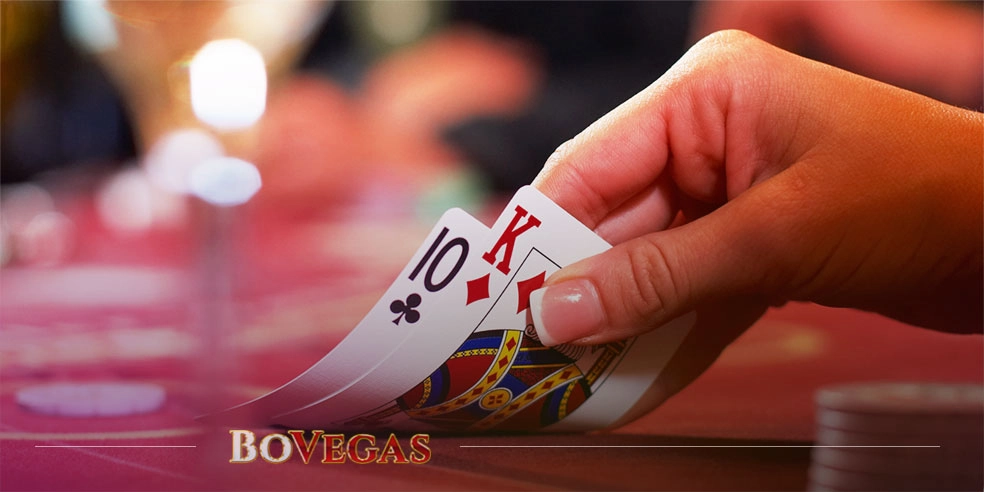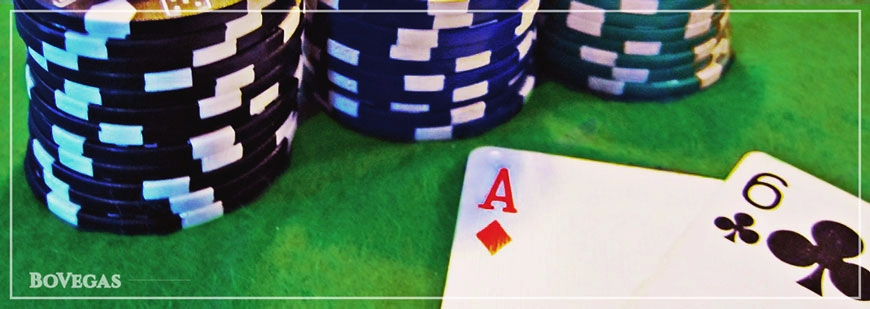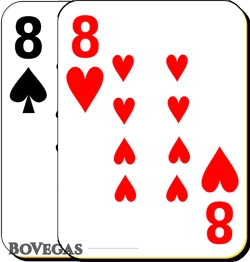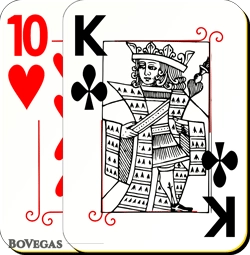



In terms of odds and chances, blackjack is known for being a popular “player-friendly” casino card game. Indeed, if you play it properly, you might even get a small edge against the house! This is a mathematically proven fact that has been known for many decades, ever since the release of the fundamental research found in Edward O. Thorp’s “Beat the Dealer,” 1966.
Then why, you might ask, if the secrets of winning strategies have been known for a long while already, do casinos still have this game on the menu? Why don’t the players get the edge all the time? The answer to this is as follows: the game of blackjack is simple, but not easy! Even if a player really masters the winning strategies and the specific decisions he or she makes are the best possible ones for every given hand, it is really difficult to stay cool, calm and collected.
It’s crucial for you to avoid distractions, and not get carried away with the game – blackjack is a thrilling game, and players might end up making emotionally-driven decisions, which is no good in the long run. The mistakes can be, and often are, quite costly!
There are many well-understood hands in blackjack which don’t require a lot of thinking – players normally aren’t making a mistake by playing them! For example, when the dealer’s upcard is 6, nobody hits a 16 and then everybody splits a pair of eights. However, there are other hands where the right decision is not so clear at all. Should I split a pair of nines against the dealer’s pair of nines? If the dealer has 3, should I decide to hit 12?
Here’s the reason why people still lose money on blackjack: they still play intuitively, instead of playing reasonably instead. We begin here with two examples of dealer’s 10 – this is a very strong dealer’s hand, which ends up in 17, 18, 19, 20 or 21 in 77% of cases, with only 23% of them busting. But chances still exist here for the intrepid gambler- you just need to make reasonable efforts to secure them, just as you would with any other hands in blackjack.

So, here are some of the trickier hands you might encounter:
According to the basic strategy, players need to double down on 6-5 against the dealer’s 10. With this hand, the player does have an advantage, and may wish to make the promising hand even more profitable. However, some players do not double down, because they’re afraid of the pat 20 the dealer may possibly be holding. Of course, he could indeed be holding pat 10. But statistically, if your opponent does not have a blackjack, and is also holding a 10 upcard, the probability that he ends up with a 20 is about ⅓ – or roughly 33%!
What are the player’s chances with this hand? Well, while holding 11, you could draw a 10 and then get a blackjack (31% chance), or else a 9 and then get 20 (8% chance). This means that your chances of making 20 or 21 are much higher than the dealer’s with a one-card draw. And what’s more, when you draw 10, 9, 8, or 7, you still win if the dealer is holding the same hole cards.
Some players may be afraid of doubling down, because it slightly lowers the overall chances of winning: so if you double down and draw a small card, then you can’t hit more to improve your score. But betting twice as much money increases your gain – and again, statistically, there is every reason to double down at this 11 vs 10 hand.
 Generally speaking, holding a 16 against a dealer’s 10 is the worst hand in blackjack. However, if your 16 is a pair of eights, you are in a much better position. You can split your pair and start two hands with a single 8 against the dealer’s 10. In this case, your chances of winning are 38%. But if you choose to just hit, not splitting your pair, your chances are only 23%. Well, that’s well below 50%, but again, we are talking about the worst hand in blackjack; and 38% chances are much better than 23%, aren’t they?
Generally speaking, holding a 16 against a dealer’s 10 is the worst hand in blackjack. However, if your 16 is a pair of eights, you are in a much better position. You can split your pair and start two hands with a single 8 against the dealer’s 10. In this case, your chances of winning are 38%. But if you choose to just hit, not splitting your pair, your chances are only 23%. Well, that’s well below 50%, but again, we are talking about the worst hand in blackjack; and 38% chances are much better than 23%, aren’t they?
After all, minimizing your disadvantage and capitalizing on your advantage are general strategies that are of equal importance for every game we play. And not only for a game!
 This particular hand is also a tricky one. Many players would gladly take the opportunity to split a pair of nines against a small dealer’s upcard. But ‘intuitive players’ may want to stay with this strong 18 if the dealer is showing 9. But the stats say exactly the opposite: 18 bet dealer’s 9 only 8 times out of 20. However, if you split your 18 and start two hands with 9s against the dealer’s 9, you win 9.5 times out of 20.
This particular hand is also a tricky one. Many players would gladly take the opportunity to split a pair of nines against a small dealer’s upcard. But ‘intuitive players’ may want to stay with this strong 18 if the dealer is showing 9. But the stats say exactly the opposite: 18 bet dealer’s 9 only 8 times out of 20. However, if you split your 18 and start two hands with 9s against the dealer’s 9, you win 9.5 times out of 20.
So all this means your 18 is strong, but not against the 9 upcard of the dealer; while splitting equalizes the chances pretty well.

Blackjack players know that whenever the dealer’s upcard is weak, the risk you take by busting your hand is not a good idea. But it’s a different matter when you’re holding 10-2 against the dealer’s 3. Because consider this: there are only four cards that are able to bust your 10-2 hand: 10, J, Q, and K. And there are five cards to help get you to the safe 17-21 zone: 5, 6, 7, 8, and 9. So, the chances that you won’t bust your hand are 5 against 4. So statistically, in the end, you lose 2% less if you hit at 10-2, instead of just standing.
As we have mentioned, 16 is the worst hand in blackjack. People are afraid of hitting, because of the risk of busting. But the mistake is to either stand or to surrender, regardless of the dealer’s upcard. Another mistake can be not splitting if your 16 is a pair of 8s, as you may be reluctant to play two hands against the dealer’s 8-9 or ace. For an 8-8 hand, refer to the Player’s 8-8 – Dealer’s 10 part of this article.
Anyway, the best strategy for your 16 hand depends on the dealer’s upcard. So if it’s small (from 2 to 6), the player should stand. But if the dealer’s upcard is high (7, 8, 9, 10, or Ace), the player should hit.
The player who decides to stay on 12 can only count on the dealer’s busting. Stay is a good idea if the dealer shows 4, 5, or 6. However, if the dealer’s upcard is 2 or 3, it’s actually better to hit on hard 12.
The only difference is the ace. If you are dealt one ace or two aces, then you have a “soft” hand. If you have no aces, your hand is called “hard.”
The best hands to split in blackjack are two aces or two eights. Other recommended splitting options include a pair of twos, threes, and sevens – if the dealer’s upcard is 7 or lower. A pair of sixes is split when the dealer shows a two through six.

Popular belief goes that the gambling system works in such a way that people don’t win, but rather lose in the long run. Allegedly, a player is influenced by psychological tricks in gambling venues. One of the main tricks involves providing a player with the opportunity to win a certain sum, rushing them into the […]
Imagine that you are in Las Vegas, you have already hit the jackpot, and the atmosphere of permissiveness and lack of limits play havoc with your hearts so intense that the two of you decide immediately to tie the knot. And it doesn’t matter that you’ve only known each other for a couple of days […]
Casino entertainments do have a certain mark which makes many filmmakers think about including some gambling scenes in their work. Such a luxurious atmosphere of gambling venues stuffed with tuxedoed men and dressed-to-kill women is definitely able to serve as a basis for many remarkable incidents. Gambling itself, as an activity which involves hope, risk, […]
Mafia and gambling have always been interconnected in many ways. Mafiosi are considered to be the founders of the modern gambling industry, and you’re never going to see a single Mafiosi movie without a scene where people are playing cards or breaking someone’s kneecaps for not paying their card debts on time. And although times […]
If you love gambling and have been to a land-based casino at least once, you may have thought about becoming a dealer. Playing the same game but from the opposite side, while communicating with other players, sounds like a dream job, right? A dealer is a straightforward job, and you will be the heart and […]
On Monday September 14, MGM announced that it plans to open its first smoke-free casino at the end of September, when Park MGM will finally reopen its venues to players and tourists. The resort comprises around 2,990 rooms and various restaurants, and it’s set to be reopened on September 30. The venue has been closed […]
Online gambling has undoubtedly taken a place of true supremacy over the casino industry during the pandemic. And the reason for that is quite clear: online casinos are more accessible, and you can always count on some encouragement from the casino administration to help you boost your game. However, this digital revolution has only been […]
The large selection of online gambling sites out there can make players somewhat puzzled, and give them a feeling of uncertainty about making the right choice of casino. Each online gambling venue offers its own conditions, games, and various bonuses, of course; but the most important thing is the reliability of the casino and the […]